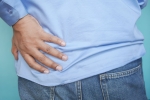Home »
Blog » Back Pain
| Stem Cell, PRP, Acupuncture in Queens & Long Island, New York
Back Pain | Stem Cell, PRP, Acupuncture in Queens & Long Island, New York
Tags: Back Pain | Posted on: 28-Aug-2024 | No of views: 594 Several rigid back braces are available today for scoliosis treatment, each differing in how they apply pressure to the spine and ribs to prevent curve progression. Some braces require full-time wear (16 to 23 hours a day), while others are only worn at night for 8 to 10 hours during sleep.
Read more
Tags: Back Pain | Posted on: 26-Aug-2024 | No of views: 516 The ideal time to address a progressing idiopathic scoliosis curve is typically before the adolescent growth spurt, a period when the curve is likely to worsen rapidly. Current medical guidelines often recommend using a rigid back brace during this critical phase to reduce the risk of severe spinal deformity.
Read more
Tags: Back Pain | Posted on: 21-Aug-2024 | No of views: 495 Spinal conditions often come with difficult symptoms like chronic pain. Interventional pain management physicians use various medical approaches to address your spinal condition and related symptoms. This includes platelet-rich plasma (PRP) therapy for many of our patients. PRP treatment is a type of regenerative medicine based on a sample of your blood. With centrifuge technology, your provider concentrates the parts of your blood that trigger healing and new growth, which can then be returned to a treatment area around your spine.
Read more
Tags: Back Pain | Posted on: 16-Aug-2024 | No of views: 627 Low back pain (LBP) involves a spectrum of different types of pain (e.g., nociceptive, neuropathic, neoplastic, and nonspecific) that frequently overlap. LBP can be caused by lumbar spine elements (e.g., soft tissue, vertebrae, zygapophyseal and sacroiliac joints, intervertebral discs, and neurovascular structures). Therapy for LBP usually begins with self-care and medication in combination with non-pharmacological methods, such as physical therapy and psychological treatment, in appropriate patients.
Read more
Tags: Back Pain | Posted on: 24-Jul-2024 | No of views: 888 Persistent or newly developed pain in the lower back after pregnancy, also known as postpartum back pain, usually lasts for 6 months but may continue up to a decade. Postpartum back pain mostly occurs while performing activities that involve body movements, such as walking, lifting, bending, and carrying the new baby, and may be relieved with rest, exercise, and home treatments. The type and severity of pain depend on the underlying cause.
Read more
Tags: Back Pain | Posted on: 22-Jul-2024 | No of views: 1736 The treatment of back pain in pregnancy depends on the stage of pregnancy, underlying causes, aggravating factors, and the presence of other medical conditions, such as diabetes or heart problems. Both medical and psychological treatments may be warranted in some cases when the ability to perform daily activities and participate in social events is significantly affected, impairing the quality of life.
Read more
Tags: Back Pain | Posted on: 19-Jul-2024 | No of views: 1222 The cause of back pain in pregnancy is often considered multifactorial, meaning several factors act concomitantly on various structures in the lower body, causing pain. These factors are commonly recognized as the anatomical, postural, vascular, and hormonal changes that take place naturally during pregnancy. While most of these changes are considered normal, rarely, a few causes of lower back pain in pregnancy may indicate serious conditions, some of which may even be life-threatening.
Read more
Tags: Back Pain | Posted on: 17-Jul-2024 | No of views: 998 Pregnant women may experience back pain that is localized to the lower back area or radiates into the buttock, thigh, and legs, causing or mimicking sciatica symptoms. The pain may be constant, get worse with activity, interfere with sleep, and/or reduce overall functioning. While the symptoms usually resolve spontaneously after delivery, some conditions may remain as chronic disorders. Women with pre-existing lower back problems are typically at a higher risk of developing pregnancy-related back pain.
Read more
Tags: Back Pain | Posted on: 15-Jul-2024 | No of views: 1021 A range of natural biological changes take place in a woman’s body during pregnancy, which directly affects the musculoskeletal system and may become a potential cause of back pain and related issues, such as leg pain. Pregnancy-related changes typically involve the joints and connective tissues, making them loose, pliable, and soft.
Read more
Tags: Back Pain | Posted on: 12-Jul-2024 | No of views: 960 Running puts, a high level of repetitive stress on the back, and for those with lower back problems it is particularly important to take measures to reduce the strain on the lower back. In general, the following tips are advisable for runners, especially for those who are susceptible to low back pain or leg pain/sciatica: Do a thorough warm-up before beginning a run...
Read more
Love this Post? Spread the World






















